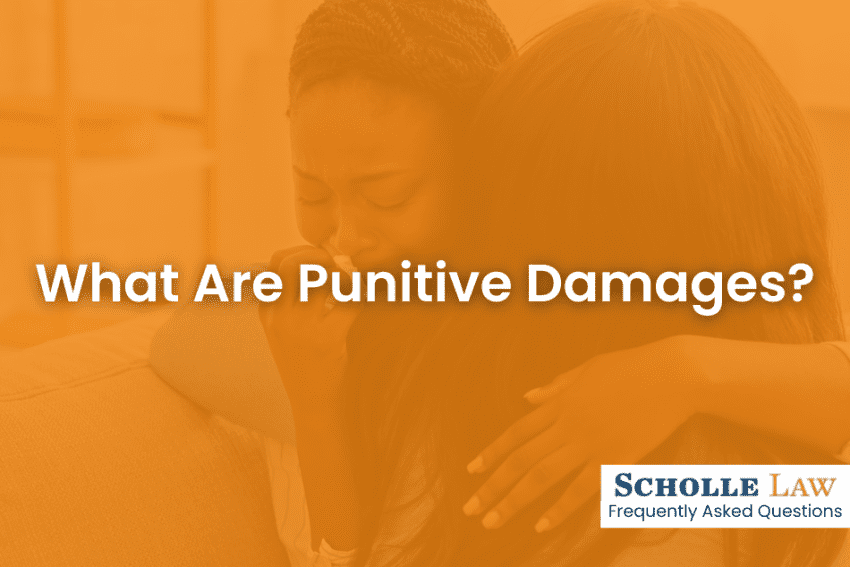What Are Punitive Damages, and Can You Receive Them for Your Car Accident or Personal Injury Case?
If you are wondering “What are punitive damages?” and whether personal injury and accident plaintiffs can receive punitive damages for their lawsuit in Georgia, then it is best to refer to the Georgia Code.
According to the statute O.C.G.A. § 51-12-5.1, it is possible for punitive damages to be awarded in personal injury and wrongful death lawsuits in Georgia in certain circumstances. The statute states that punitive damages may only be awarded in what is termed as “aggravating circumstances.”
It should be understood that punitive damages are not designed to deter any specific type of behavior. Instead, punitive damages are intended to deter, punish or penalize the defendant involved in that specific case. For this reason, punitive damages are not always awarded in all cases. Such damages are only awarded in specific circumstances.
Types of Personal Injury Damages
When an individual suffers a personal injury as a result of the negligence of another party, it’s possible to file a lawsuit in order to recover damages. Based on the injury, the plaintiff could potentially recover different types of damages. Those damages include:
- Economic damages. This type of damage is intended to reimburse the plaintiff for lost wages and the costs associated with medical bills.
- Non-economic damages. This type of damage includes emotional distress as well as pain and suffering. Specifically, this could include the pain suffered as a result of an accident or the emotional distress associated with a physical injury, such as anxiety.
- Punitive damages. This type of damage may be awarded when it is determined that the defendant acted with what is termed as “gross negligence.”
Examples of Punitive Damages in Georgia
In order for punitive damages in personal injury cases to be awarded, there must be clear and convincing evidence. This means that in order for a jury to award such damages, a much higher evidentiary standard is required. In most instances, the standard requires a “preponderance of the evidence.” Under this standard, the evidence against the defendant must be greater than 50 percent.
Regarding punitive damages, Georgia juries may only award such damages when there is clear and convincing evidence indicating that the actions of the defendant demonstrated willful malice, misconduct, wantonness, fraud, want of care or oppression. Such actions would demonstrate a conscious indifference on the part of the defendant to consequences for their actions.
Types of Cases in Which Punitive Damages Might Be Awarded
Punitive damages may be awarded in Georgia in a variety of different cases, provided there is clear and convincing evidence. Possible examples of such cases might include:
- Robbery
- Sexual assault
- Assault with a deadly weapon
- Nursing home abuse
- Kidnapping
- Drunk driving
- Felony assault
- Product liability (defective product)
The Collection of Punitive Damages
In the event that a verdict is returned and includes punitive damages, the entire award is often paid by the defendant’s insurance company. The only exception in which an insurance company might argue that it is not their obligation to pay the damages is in the event that the insurance company in question is actually the plaintiff’s own insurance company. This type of situation might occur in the event the plaintiff must pursue compensation from their own insurance carrier.
In such cases, punitive damages would not be paid due to the fact that uninsured motorist insurance coverage is only applicable to compensatory damages and not to punitive damages.
Under Georgia personal injury law, there are no caps or limits regarding the amount of punitive damages that a jury may decide to award. Punitive damages may only be assessed against a specific defendant one time within Georgia.
Additionally, it should be understood that 75 percent of those damages must go to the state, minus a portion of litigation costs. This is because punitive damages are not intended to provide compensation to the plaintiff in the case but instead to penalize or punish the defendant.
Punitive damages in personal injury cases might also be awarded in drunk-driving cases or in other cases where the defendant was high at the time of the crime. In such cases, the evidence must demonstrate that the defendant either intended to do harm to the plaintiff or was negligent while under the influence of drugs or alcohol. There is no cap for punitive damages in such cases under Georgia law. Punitive damages are not required to be divided between the plaintiff and the state in such cases.
Most personal injury cases that warrant punitive damages in Georgia fall under the category of wrongful death cases. In such cases, punitive damages have a cap of $250,000.
Meet with an Experienced Georgia Personal Injury Lawyer
If you or someone close to you has suffered a personal injury or if a loved one was the victim of a wrongful death case, it’s important that you explore punitive damages as a possible option. Charles Scholle is an attorney who is experienced in handling wrongful death and personal injury cases. He can provide you with all the information you need, and ensure the case is handled properly to recover maximum damages allowed under Georgia law.
Call Scholle Law today at (866) 592-1296 or contact us online to schedule your free consultation.

